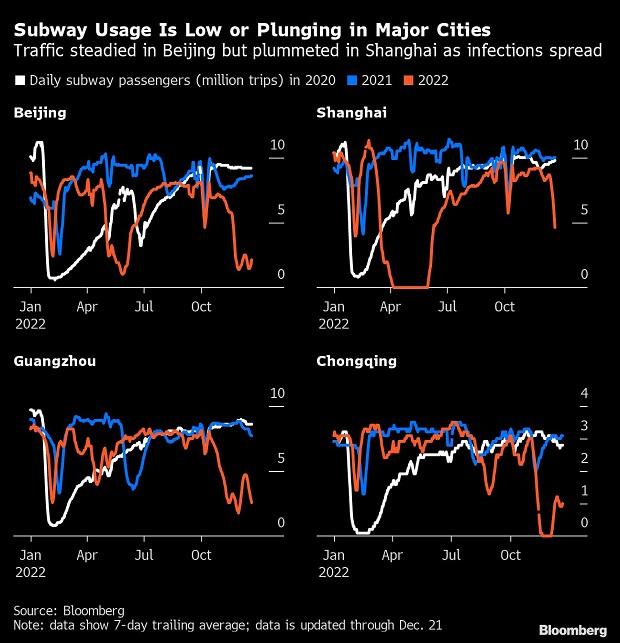China’s soaring Covid-19 infections push economic activity off a cliff

China’s soaring Covid infections are keeping people home and causing a slump in travel and economic activity, according to the latest high-frequency data.
Following the recent abrupt end to Covid Zero controls, more cities have been hit by an exit wave of infections in the past week, leading to crowded hospitals and queues at funeral parlors. That’s keeping people in Beijing, Shanghai and elsewhere from going out despite workers in some places being told to return to work even if sick.

Several measures of mobility including traffic congestion in major cities, subway usage and the number of domestic flights have all slumped. In recent days subway passenger numbers have plummeted in cities including Shanghai, Guangzhou, Shenzhen, Xi’an and Nanjing as infections surged, while in Beijing, one of the cities that experienced the infection wave the earliest, subway usage steadied and picked up slightly over the past four days, although it is still around 80% below the level on the same period in 2019.
Also read: US ready to help China with vaccines to control Covid: State Secy Blinken
Congestion levels across 15 major cities are 56% below the level in January 2021, the benchmark used in an index compiled by BloombergNEF based on Baidu Inc. traffic data. That’s worse than during the lockdown of Shanghai and other cities in the spring. The only other time this year it’s been lower was in early February, when the Lunar New Year period saw factories and restaurants close and people leave big metropolises to return home.
“The spike in Covid-19 infection rates following the easing of mobility restrictions will still constrain economic activity in the December-January time frame,” which is consistent with the experience of other Asian economies, said Guan Yi Low, head of fixed income for Asia Pacific at M&G Investments.

The economy is set for more pain and uncertainty as the wave of infections spreads, with the lack of trustworthy statistics on cases and deaths making it difficult to predict when the outbreak might peak or start to wane. However, Chen Qin, chief economist at data consultancy MetroDataTech, forecasts the current wave of infections will peak between mid-December and late January for most cities, based on an analysis of online keyword searches.
Policymakers and economists are counting on consumers to be a major driver of any economic rebound after infections slow down next year. People piled up savings in 2022 due to Covid disruptions and the property crisis and getting them spending again will be key for an economy suffering from low business confidence, declining external demand and the persistent housing downturn.
So far, a reopening-driven surge in domestic flights appears to have been short-lived, with people quickly cutting back on travel in the past week. The number of flights on Thursday fell to 42% of 2019 levels, according to provisional data from Chinese aviation data company VariFlight.

More Moviegoers
Cinemas and movie companies have suffered from Covid lockdowns and restrictions throughout the pandemic, but are now seeing the first meaningful improvement in box office revenue since the seven-day public holiday at the beginning of October, despite the Covid surge.

Thanks to the debut of Walt Disney Co.’s Avatar: The Way of Water, the daily average box office climbed to over 50 million yuan ($7.2 million) from 17 million yuan two weeks ago, according to data from online ticketing platform Maoyan Entertainment.
–With assistance from Jinshan Hong, Danny Lee and Lin Zhu.
business-standard.com

